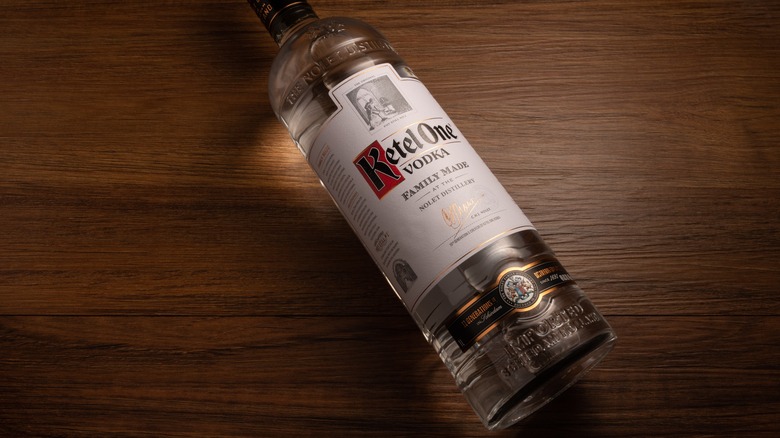How The Bartending Community Helped Create Ketel One Vodka
Since its debut in 1983, Ketel One vodka has built an impressive reputation among drinkers and bartenders alike as one of the absolute best vodka brands in the world. Whether in a cosmopolitan, bloody Mary, martini, or served straight, Ketel One is a beloved vodka brand by a wide variety of drinkers. This is even more surprising due to the brand's reluctance to advertise. According to VinePair, the brand only first advertised after 20 years on the market and mostly relied on word of mouth to help craft its place on bar shelves everywhere.
Certainly, one quality that helped propel the brand was its long history. Ketel One was created by the 10th generation of the Nolet family of distillers, per VinePair. The Nolets began distilling genever in Schiedam, Holland, more than 300 years ago. The Manual says that genever is a type of unaged, malted spirit that is flavored by aromatics like juniper and bears a strong resemblance to gin.
The family would set out to expand into the American market in 1902 but would leave 18 years later at the start of prohibition. When Carolus Nolet took over the business in 1979, however, he set out to craft a spirit that would appeal to the American cocktail market.
Ketel One was well researched
Ketel One vodka would be the final product of Nolet's odyssey, but it would take years of research before a product would come to market. Current master distiller Bob Nolet told Travel + Leisure that bartenders were highly instrumental in developing the spirit that would become Ketel One vodka. His father, Carolus Nolet, consulted bar staff both in Holland and elsewhere throughout the product's development. Qualities such as Ketel One's signature bottle and the vodka's tasting notes would be just some of those that stemmed from these conversations. Ketel One says that its vodka's flavor was also influenced by Carolus Nolet's great, great grandfather's own tasting notes as well.
VinePair points out that some of that unique flavor would also be due to its distillation process. Ketel One's distillation is akin to a hybrid method that uses the column stills typical of vodka making, as well as pot stills that are more frequently used for spirits like rum, scotch, and gin.
It's no wonder then that Ketel One was able to have so much success by word of mouth alone. Nolet revisited many of the bartenders that spoke with him after he created the spirit, and the brand quickly grew, per Ketel One. Its unique production method and reputation among bartenders likely lended to its quick success.

